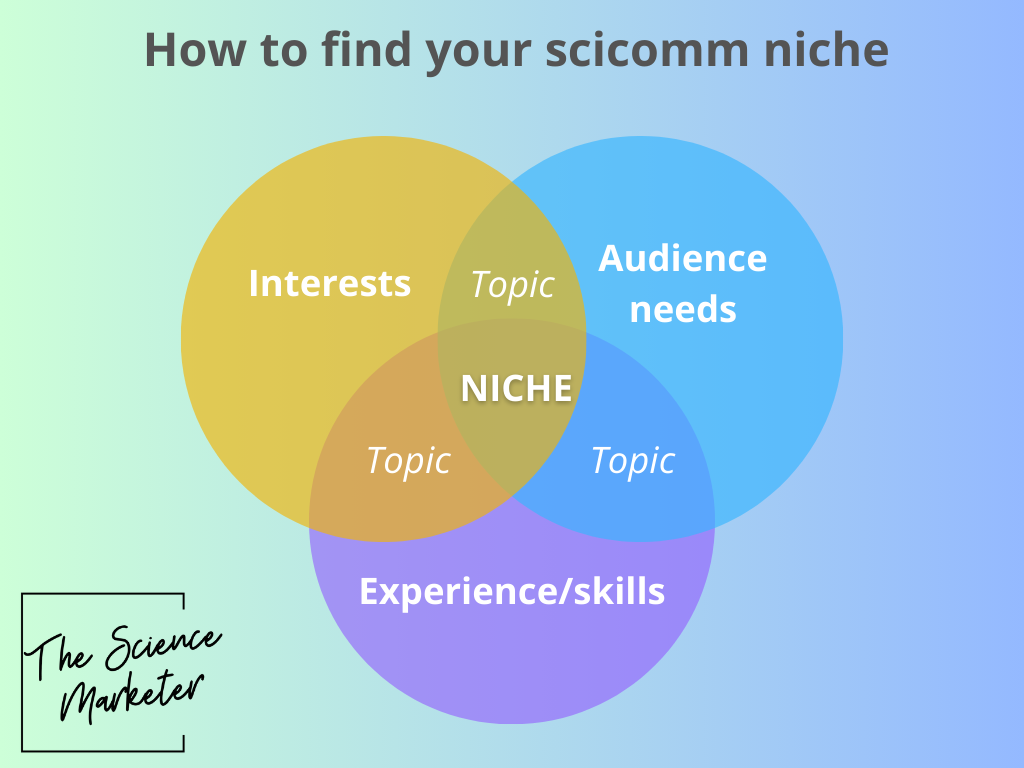As science marketers and communicators, we often wear many hats. We’re curious, creative, and passionate about all sorts of complex topics, from genomics to AI, from lab tech to clinical trials.
But when it comes to marketing, trying to speak to everyone is one of the fastest ways to get ignored.
That’s where defining a niche comes in.
In marketing terms, a niche is your positioning. It’s the specific intersection of your expertise, your audience’s needs, and the problems you solve. It’s what makes your message land with clarity and relevance.
So before diving deeper, it’s worth exploring what a niche really is in a marketing context, and why it can be a powerful foundation for your strategy.
What is a niche, really?
A niche is that intersection where your interests, strengths, and the needs of a particular audience meet. It’s more than just picking a topic. It’s the space where you can offer something uniquely valuable to a group of people.
A niche can be small—maybe just a few hundred people—or quite large, stretching into the millions. The key isn’t the size, but the clarity: you’re speaking to a specific audience with a specific need.
Take “cooking,” for example. That’s a huge topic. But “gluten-free cooking for vegans” is a clearly defined niche. It serves a particular group of people looking for something specific, and that’s what makes it powerful.
Let me share a personal story.
When I started my career in science communication, I decided to focus on biotech professionals in France who were interested in keeping up with the industry. It was a relatively small group—somewhere between 50,000 and 100,000 people—but it was the right group. It gave me a clear direction and helped me build a meaningful connection with my audience.
Later, I expanded this focus to the broader European biotech scene, which led to the creation of Labiotech.eu. That platform grew from the same core idea: serving a specific audience with relevant, high-quality content.
I’ll come back later to how I chose this niche and how you can find your own, but first, let’s explore why narrowing your focus can actually help you go further.
Why a niche is a competitive advantage
In science marketing, it’s tempting to keep things broad: to write for all scientists, to post for all healthcare professionals, or to create content for all biotechs.
But the reality is, generalist messages rarely get traction. That’s because:
- They don't speak directly to a specific audience
- They lack the depth that builds trust and credibility
- They get lost in a sea of sameness.
By contrast, when you focus on a niche:
- Your messaging becomes clearer and more relevant
- Your content resonates more deeply
- Your audience is more likely to remember and return to you.
One common concern is that choosing a niche might box you in. But the opposite is often true. And when the time comes to pivot, your reputation and knowledge carry over.
I’ve seen many marketers and communicators shift from one field to another—from synthetic biology to medical devices, from startup to big pharma. Their niche gave them a foundation that made the transition easier.
Niches evolve, and so can you.
How to define your marketing niche?
Before we get into the framework, there’s one ingredient that’s really important to consider when choosing your niche: passion.
If you’re not genuinely interested in the space you choose, it’s going to be hard to sustain your content, connect with your audience, or build long-term credibility. Your niche should energize you, because marketing takes consistency, and consistency comes much more naturally when you care.
With that said, the most effective way to find your niche is to look at the overlap between three key elements:
- Your skills and experience
- What do you know well?
- What problems can you solve?
- Your interests
- What topics excite you?
- What could you create content about regularly?
- A need you've identified
- Who is underserved?
- Where is there a clear problem to solve?
The crossing of those 3 criteria forms a specific niche, as this figure shows:

To find your own niche, start by establishing a list of items for each of the 3 elements.
Be as descriptive as possible, and don't be afraid to include subjects that seem totally unrelated (that's where the magic happens).
In my case, the list might look something like this:
1/ Experience:
- running a small business
- creating online content
- running a digital media/newsletter
- online marketing
2/ Interests:
- life sciences
- creativity/content distribution
- communication/writing
3/ Needs:
- Science marketers looking for resources
- PhD students exploring career alternatives
- Science writers seeking community
These elements combined naturally into a niche focused on science marketers and communicators, which led to the creation of The Science Marketer. And within that, I can speak to adjacent audiences who share similar needs.
This kind of niche clarity makes your marketing more focused and effective.
Putting your niche into practice
Defining a niche is just the first step. To build visibility and trust in that space, you need consistency.
In marketing terms, this means:
- Creating content tailored to your audience’s needs
- Sharing that content on the right platforms
- Repeating your key themes over time.
Let me give you an example.
Spencer Knight, a biotech recruiter, built his reputation by focusing on Cell & Gene Therapy. He didn't just say he worked in CGT—he demonstrated it, every day, through valuable LinkedIn content tailored to CGT professionals. Today, he’s seen as the CGT recruiter.

The same applies to marketers:
- If you serve diagnostics startups, create diagnostics-specific content
- If you're marketing for a CRO, share operational insights tailored to biotech companies running their first clinical trials
- If you're helping researchers transition into industry roles, focus on content that demystifies non-academic career paths within life sciences
The clearer your niche, the easier it is for people to associate your name with value in that space.
Your niche will evolve—and that’s a good thing
No niche is set in stone. Your interests or your role may shift. Your audience’s needs will change. New technologies or trends might open up new opportunities.
That’s part of the process.
Good marketers don’t just define a niche once, they revisit it regularly:
- Are you still serving the right audience?
- Has your message evolved with the market?
- Is your content still solving real problems?
Evolving your niche doesn’t mean abandoning your foundation. It means building on what works, refining your focus, and staying useful.
Your audience will notice your growth and appreciate it.
Choosing a niche is one of the most strategic decisions you can make as a science marketer.
It gives you clarity, focus, and a stronger foundation for all your content, campaigns, and communication. It helps your audience understand who you are, how you can help, and why they should pay attention.
Start with your strengths. Align them with your interests. Find the needs no one else is meeting.
And then, show up consistently.
That’s how you build trust. That’s how you grow. That’s how you market with purpose.






